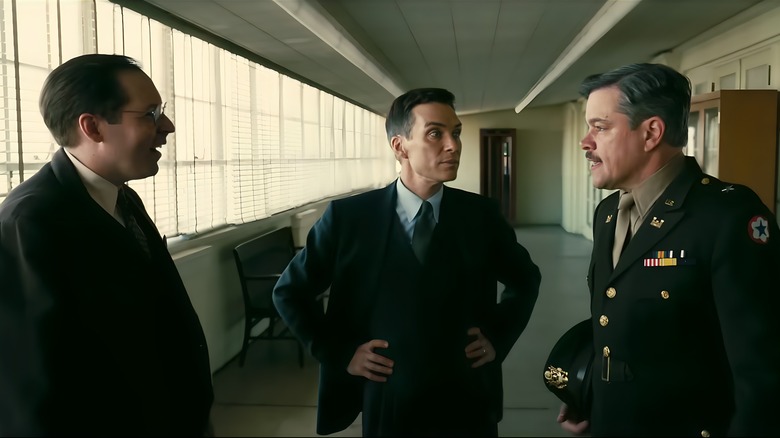Why Oppenheimer Is Dividing Anti-Nuclear Activists
Christopher Nolan's "Oppenheimer" was bound to get tongues wagging from day one. The film's terrifying subject matter and overpowering visuals are designed as a stark reminder that we still live in the nuclear age that was sparked by the Trinity Test nearly a century ago. While "Oppenheimer" has everyone talking, though, there's hardly agreement when it comes to the message of the film.
Some think the movie shines a light on the past few decades of relative anonymity when it comes to nuclear science. For instance, Sebastian Brixey-Williams, director of the BASIC think tank in London, hopes the film will shake the deep apathy that the public has toward the potential of nuclear war. In an interview, Brixey-Williams told The Guardian, "The universe is calling for people to start doing this kind of film. In some ways it's quite elegant because it's not looking at some of these issues directly, but asking more reflective questions about nuclear weapons – and that internal struggle Oppenheimer faced really plays out at a societal level. They are difficult trade-offs to make."
Actor Matt Damon (who plays General Leslie Groves in the story) uttered a similar sentiment in an interview during the lead-up to the film. The American actor observed, "How did I forget about this? It's like the Cold War ended and my brain played a trick on me and said, 'OK, let's put that away, you don't have to worry about that anymore' — which is absurd." Damon added that after Russia invaded Ukraine, "suddenly overnight it became the most important thing for us all to think about again."
While these are positive lessons we can draw from "Oppenheimer," there are many who take a different position from the more positive spin on Nolan's latest film.
Others think the film sent the wrong message (or at least not a strong enough one)
There are some who disagree with the positive feedback. For example, the co-chair of the Campaign for Nuclear Disarmament's London branch, Carol Turner, thinks the film sends a lopsided and mixed message. "The overall impact of the film is unbalanced," Turner declared to The Guardian, "People leave the theatre thinking how exciting a process it was, not thinking 'God, this was a terrible weapon of mass destruction and look what's happened today'."
Turner criticizes the fact that the film didn't go far enough with its visuals, too, "The effect of the [Hiroshima and Nagasaki] blasts was to remove the skin in a much more gory and horrible way — in the film it was tastefully, artfully presented. There's nothing wrong with that, but if you look at photographs of actual survivors and read accounts of what happened to them it was a very horrifying, gory death."
As a final dig, Turner adds that the portrayal of Oppenheimer, while generally accurate, tended to put him in a very positive light. It made him a victim and a hero to the audience despite the fact that he headed up the controversial Manhattan Project.
Whether for or against the movie's message, there's no doubt that "Oppenheimer" has reignited an essential conversation for those living in the 21st century. It is helping to reveal how much the groups working against nuclear war are absent from the public discussion. They aren't noticed in the same way that, say, climate change is. The potential for a sudden, apocalyptic crisis from a nuclear threat is simply not at the front of most people's minds, even if rising tides and warming weather are. Here's hoping "Oppenheimer" helps to change that status quo.

